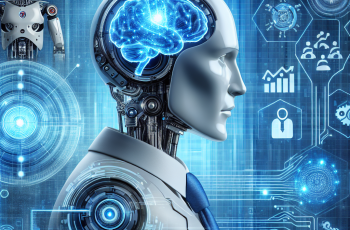AI in Space Exploration: Charting the Future of Cosmic Discovery
- AI drives autonomy: Enhances spacecraft operation with minimal human intervention.
- Data processing: AI accelerates data analysis for improved scientific outcomes.
- Operational efficiency: Automates tasks, allowing teams to focus on strategic planning.
- Interdisciplinary skills: Essential for talent acquisition in the evolving AI landscape.
Overview of AI in Space Exploration
Artificial intelligence is at the forefront of the technological advancements that are shaping space exploration today. With its capability to enhance the efficiency and efficacy of missions, AI has a profound effect on researchers and engineers striving to make sense of vast amounts of data and the unpredictable nature of space environments. By automating complex processes, AI has allowed space agencies and private enterprises to conduct missions that would have been impossible just a few years ago.
Key Applications of AI in Space Exploration
Autonomous Navigation and Exploration
One of the most groundbreaking applications of AI in space exploration is its role in autonomous navigation. Spacecraft, such as the Mars rovers Perseverance and Curiosity, utilize advanced machine learning algorithms to independently navigate the challenging Martian landscape. These AI systems can identify obstacles, plan safe paths, and select research sites while significantly reducing the need for constant human oversight—a crucial capability given the substantial communication delays between Earth and distant planets (source, source).
Satellite Management and Operations
AI is also transforming the management and operation of satellite networks. The European Space Agency (ESA) employs machine learning algorithms to coordinate satellite mega-constellations that act as critical assets for Earth observation, communications, and space weather predictions. Companies like SpaceX leverage AI not only for satellite management but also for automatic docking with the International Space Station (ISS) and advanced collision avoidance maneuvers within the Starlink network (source).
Onboard Data Processing and Scientific Research
Spacecraft often encounter vast streams of data from various sensors and instruments. AI-powered systems are essential for processing this complex information, enabling real-time decision-making for various scientific investigations. For instance, ESA’s OPS-SAT uses deep learning models to enhance image quality and detect Earth features while ensuring optimal spacecraft control (source, source).
Robotics and Construction
Robots and AI-driven systems are set to play a pivotal role in constructing habitats and research stations on the Moon and Mars. By minimizing human risk, these technologies can autonomously adapt to environmental changes, undertake complex building tasks, and efficiently manage infrastructure development in harsh extraterrestrial conditions (source).
Mission Operations Support
AI tools are increasingly being integrated into mission planning and operations support. From schedule optimization to anomaly detection, these systems improve crew management and enhance operational efficiency on missions, as evidenced by their utilization on the ISS (source).
Notable Examples and Initiatives
The application of AI in space exploration has a rich history, featuring notable experiments and initiatives that showcase its potential:
- NASA Autonomous Sciencecraft Experiment (2003): This early initiative validated AI for independent scientific data analysis and spacecraft operations (source).
- ESA’s OPS-SAT Lab: This laboratory has experimented with deep learning algorithms to improve image processing and spacecraft attitude control (source).
- SpaceX’s AI Autopilot: This system facilitates real-time docking, landing, and satellite coordination to ensure safe and reusable launches (source).
Benefits of AI in Space Exploration
Increased Autonomy
AI enhances mission autonomy, allowing spacecraft to react rapidly to unforeseen situations without relying on Earth-based operators. This capability expands the range of mission opportunities and makes interplanetary exploration more feasible (source, source).
Enhanced Data Analysis
With AI’s ability to process vast datasets more swiftly and accurately than human analysts, missions get better scientific outcomes, which enables us to glean valuable insights from our cosmic endeavors (source).
Operational Efficiency
AI automates routine and complex tasks, allowing human resources to focus on strategic planning and innovation, directly benefiting project efficiency and success (source, source).
Challenges and Opportunities
Robustness and Reliability
AI algorithms must be designed to function reliably in extreme environments where computational resources are limited (source).
Real-Time Decision Making
A significant challenge lies in ensuring that AI systems make safe and effective decisions without human oversight, especially as missions travel further from Earth (source, source).
Data Security and Ethics
As the reliance on AI grows, so do concerns regarding data protection and the ethical implications of AI operations. Ensuring transparency and explainability in AI systems is crucial (source).
Future Prospects
Looking ahead, advancements in AI will likely usher in new opportunities for automated space operations, enhancing mission safety and enabling entirely new classes of scientific inquiry. As agencies and private companies expand their operations beyond Earth, AI will undoubtedly remain central to the next era of space exploration (source, source, source).
Practical Takeaways for Recruiters and HR Professionals
As AI continues to reshape the landscape of space exploration, it’s essential for HR professionals and recruiters to consider the implications for talent acquisition:
- Look for interdisciplinary skills: As AI integrates with various sectors like engineering, robotics, and data science, candidates should possess a mix of expertise that reflects this convergence.
- Promote continuous learning: The rapid advancements in AI necessitate ongoing training and development programs for employees to stay updated on the latest technologies and methodologies.
- Foster innovation: Encourage a culture that supports creative thinking and experimentation, which is crucial for driving advancements in AI applications.
- Prioritize ethical considerations: As AI technologies evolve, ensure that your recruitment processes align with ethical standards and promote responsible innovation.
Conclusion
The integration of AI in space exploration is transcending traditional barriers and opening up possibilities previously thought to be unattainable. With its growing role in navigation, satellite management, data processing, and other areas, AI is revolutionizing our approach to cosmic inquiry.

